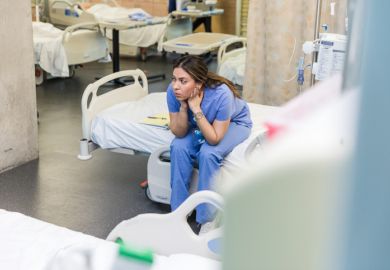There could be research opportunities for academics in the area of mental health and wellbeing if the Government accepts the recommendations contained in a new wide-ranging report.
Mental Capital and Wellbeing was published last week by the Foresight think-tank, which is headed by John Beddington, the Government's Chief Scientist.
The report, the result of two years' work, features contributions from more than 400 experts and brings together the latest scientific evidence in areas ranging from neuroscience to economics. It proposes a number of ways in which Government and society can help the UK to realise its "mental potential".
It concludes that "mental capital" - which it defines as people's cognitive and emotional resources - is critically important to delivering economic and social benefits for the future. It also pinpoints research fields that need to be targeted.
"There are areas where research is crying out to be done, and there are areas where one needs to be looking at ways in which you can evaluate policy interventions," Professor Beddington told Times Higher Education.
His report, which is now being scrutinised by government departments, looks at three main themes: "learning in the early years", "wellbeing at work" and "the ageing population".
It identifies nine areas needing more work. For some it recommends specific research priorities while for others it suggests how research might be approached. It says, for example, that the Government should fund more large-scale longitudinal studies to track wellbeing over time.
"(The studies) are expensive, but they have the capacity to give us a lot of answers," said Rachel Jenkins, a professor of mental health policy at King's College London, who was part of the science co-ordination team. The report also stresses that the focus should be on multidisciplinary research spanning science and social science.
Barbara Sahakian, a professor of clinical neuropsychology at the University of Cambridge, co-ordinated the findings on the ageing population. In this area, a research priority is finding the best "biomarkers" - subtle changes in the biology of the body - to identify dementia diseases such as Alzheimer's at an early stage. If the disease can be identified before damage is done, she said, treatment is more likely to be effective.
She also called for investigation of "brain training" games and devices sold to older people to keep their minds active. "People are using these things, but we really haven't assessed them properly to ask 'are they really activating the neural networks that we want activated' and 'are they really helping and working in the long term'," she said.
She added that work of this type should involve epidemiologists, social scientists and neuropsychologists.
Cary Cooper, a professor of organisational psychology and health at the University of Lancaster, co-ordinated the findings on wellbeing at work. He said research is needed to quantify what health and wellbeing contribute to business bottom lines.
"We know that if you improve health and wellbeing, you can reduce sickness absence and that it can increase people's job satisfaction. (But) what we don't know is what the impact is on the productivity and performance of the company."
Cooper added that it is important to study this because until there is evidence, "wellbeing at work" will continue to be seen as peripheral to business.
He would also like to see research carried out on stress-management intervention. "A lot of companies are involved in doing stress audits ... What kinds of stress-management interventions work to improve wellbeing, health and the productivity of the business? We have to evaluate their effectiveness."
He wants multidisciplinary teams of economists, physiologists and occupational health scientists to come together to address the questions.
The findings on childhood were co-ordinated by Usha Goswami, a professor of education at Cambridge. She highlights the need for psychologists and neuroscientists to work towards understanding "basic sensory-processing mechanisms" for the various learning difficulties such as dyslexia, with the aim of improving screening and the quality of interventions.
For now, though, academics will have to wait. "What we have done is laid out the evidence for (the Government), and it is up to them to decide where their priorities go," Professor Goswami said.



